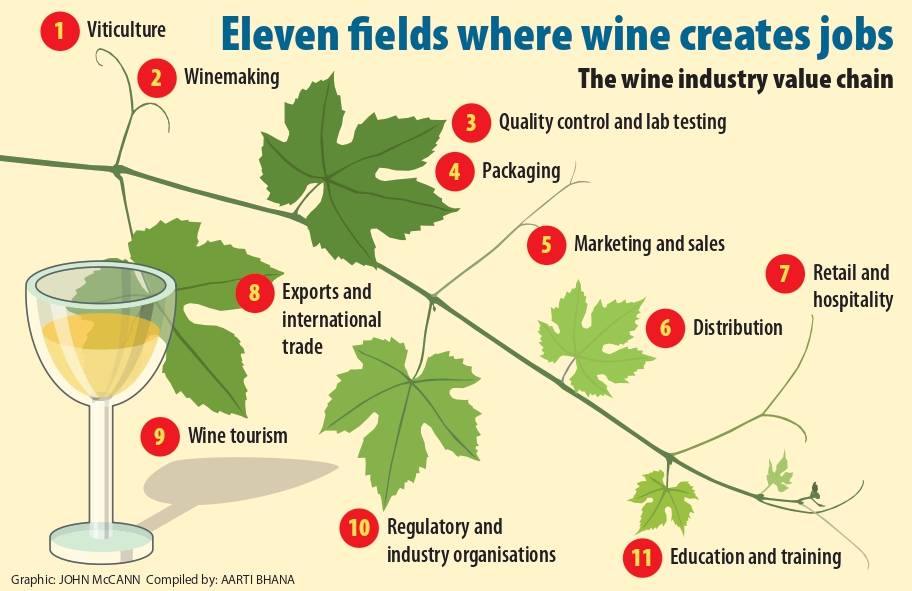Sweet rosé is often people’s first introduction to wine.
As you indulge in a glass of South African wine, you’re not just savouring its bold, complex flavours, but also partaking in an industry that plays a vital role in the economy.
From the vineyards to the bottle, the wine sector drives economic growth, enhances rural development and exports top-tier products worldwide, all while embodying the country’s rich agricultural heritage.
The country has maintained its position as one of the top wine producers globally, ranking eighth in the world, according to South Africa Wine, which provides support services to the wine and brandy industry. It says wine tourism contributed R7.2 billion to GDP in 2023, creating 34 406 employment opportunities and 80 173 jobs at wine farms and cellars.
In the same year, the local industry contributed 4.1% to the world’s wine production and 4.3% to the world’s wine exports.
Wines of South Africa, another organisation in the sector, said earlier this year that the country’s white wine “continues to win the popularity contest, with sauvignon blanc leading the charge, followed by chenin blanc and chardonnay”. For red wine, shiraz takes the lead, closely followed by pinotage and cabernet sauvignon.
Key markets driving export growth include the United Kingdom, Germany and the Netherlands, with increasing interest from China and the United States, said Rico Basson, chief executive of South Africa Wine.
Although the sector struggled during the Covid-19 pandemic when alcohol bans and lockdowns were in place, it maintained its position as a key export commodity.
“While the wine sector has faced several challenges, it has also adapted and evolved, leveraging new technologies and trends to thrive in the global market,” Basson said.
“The South African wine sector has shown resilience and adaptability in various challenges, focusing on quality improvements and sustainability while navigating economic and environmental pressures.”
There are at least 11 steps in the wine-production process, starting from the cultivation of vines to harvesting and transforming the grapes into wine and the final stages of distribution, export and international trade. Then there is wine tourism, which includes tours, tastings and wine-related events that attract tourists and promote wine regions.
The industry is complex and multifaceted, and many players — from farmers, vineyard managers, cellar masters and wine tasters to packaging specialists, distributors, sellers and promoters — have a crucial part in the value chain.
 (Graphic: John McCann/M&G)
(Graphic: John McCann/M&G)
“This sector has substantial potential for driving economic growth, particularly for regions with high-quality wine production,” Basson said.
“Expanding into new international markets can significantly increase revenue and create economic opportunities. Wine exports contribute to trade balances and can boost local economies by creating jobs and increasing investment.
“By attracting tourists, wine regions can stimulate local economies through spending on accommodations, dining, transportation, and related services. Developing wine tourism can create jobs, promote regional development, and increase overall economic activity,” he added.
The wine sector also plays a role in rural areas, driving the informal economies there when seasonal workers harvest the crop.
“During the harvest season, they will put more workers onto the farm to assist with actually doing the harvest. As a result, typically, what you see is that the informal sector around some of the big farming towns is growing quite significantly,” said Citadel chief economist Maarten Ackerman, listing beauty salons, restaurants, street food vendors and spaza shops as examples.
The wealth management firm recently presented a report that highlighted the informal economy flourishing around wine farms in the Western Cape.
According to Basson, for every R1 million in sales revenue in the wine industry, 7.51 informal jobs are supported.
“The employment-to-employment multiplier of 3.15 means that for every job in the wine industry, an additional 2.15 jobs are supported throughout the rest of the economy, for a total of 3.15 jobs when including the initial job in the wine industry,” he said.
“These figures highlight the industry’s role in providing opportunities within the formal and informal sectors.”
Let that sink in as you continue to sip on the flirty, fruity flavours of a real South African wine.